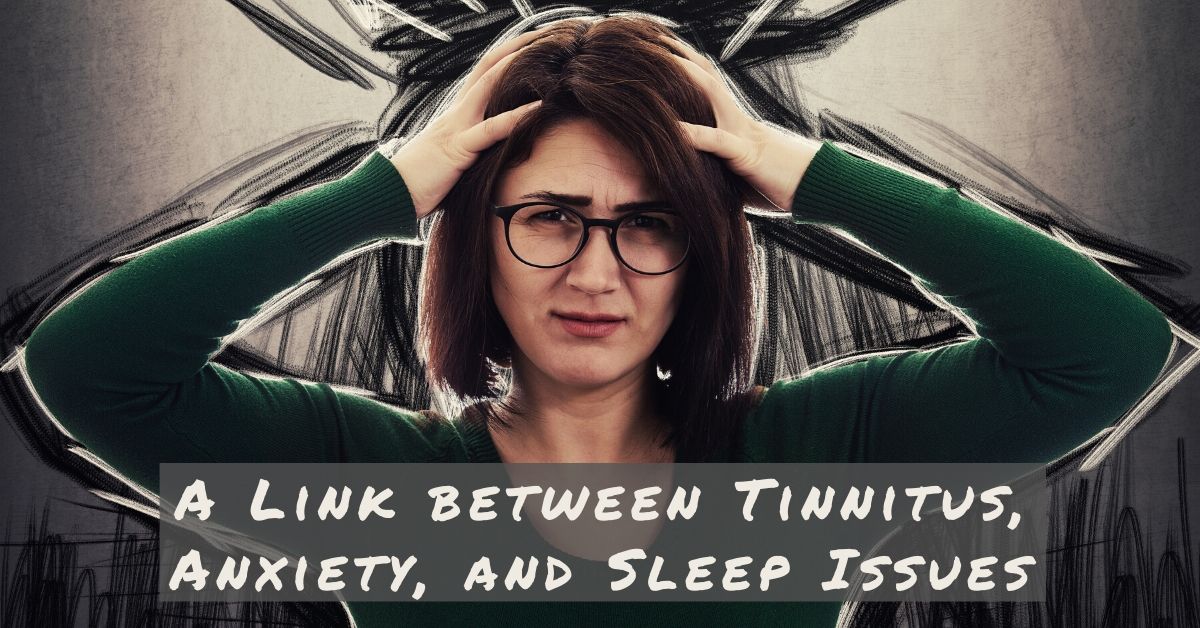
Most of us think hearing loss only affects our ears, but it turns out that’s not exactly true. Not only does hearing loss make it harder to hear, it can also go hand in hand with tinnitus, that annoying ringing or buzzing sound in your ears. Hearing loss and tinnitus can lead to anxiety and even sleep issues.
What is Tinnitus?
Tinnitus is a phantom sound that only you can hear. It’s most noticeable when you’re in a quiet room, and everything around you are very silent. People have described tinnitus as sounding like a buzzing, whistling, roaring, or whooshing. Some have even said it sounds like a shrill dog whistle. Tinnitus can be at a high or low pitch, and each person experiences it differently. Sometimes it’s temporary, and you may not notice it at all for several days. For others, tinnitus is a constant source of irritation and discomfort.
Tinnitus is quite common, and approximately 15% of Americans experience tinnitus.
What Causes Tinnitus?
Tinnitus is caused by damage to the cells in the inner ear. When the cells in the ear are healthy, they can translate sound waves in the environment into electrical impulses. These impulses get sent to the brain, and that’s how you hear. When the cells are damaged or overstimulated, they’ll still occasionally send signals to the brain, even if those sounds aren’t in the environment. Tinnitus can be caused by:
- Hearing loss
- A buildup of earwax in the ear canal
- Exposure to dangerously loud noise
- A head or neck injury
- An infection in the ear
For people with permanent tinnitus, the constant sound of tinnitus affects their hearing as well as their overall health. Tinnitus can lead to a feeling of pressure on the ear, and make it hard to hear sounds clearly.
Tinnitus and Anxiety
Tinnitus is also closely linked to stress and anxiety. When you experience tinnitus, the constant noise starts to get on your nerves. It makes it hard to concentrate on tasks, or even have a normal conversation with a loved one. When tinnitus makes you more anxious, you’ll start to notice the tinnitus even more, and your experience of tinnitus will be worse. As the tinnitus gets worse, you’ll feel even more anxious!
This anxiety can make it difficult to focus, and you’ll be more easily upset. You will have a hard time being patient with yourself and with others, and have a hard time getting through the day.
Tinnitus and Sleep Issues
Tinnitus can lead to high levels of stress and anxiety. Taken together, tinnitus and anxiety can lead to a host of sleep issues, and getting enough sleep may seem impossible. The experience of tinnitus during the night can make it very hard to fall asleep, and make you feel more stressed. Tinnitus often seems louder when the room is quiet, so the silence of your bedroom may make tinnitus even more intrusive.
As your anxiety levels rise, it becomes more and more difficult to fall asleep and get the rest you need. When you aren’t sleeping enough, you’ll feel even more anxious, and your tinnitus will be even more noticeable.
Treating Tinnitus
Thankfully, there is a way to break this cycle of tinnitus and anxiety, and get a good night’s sleep. Most tinnitus treatments include sound therapy. When you play a sound at the frequency as the tinnitus, the tinnitus will fade into the background, and you’ll be able to go about your day, or get to sleep, without thinking about tinnitus. You may have tried sound therapy on your own, and masked tinnitus sounds during the day by turning on the TV for background noise, or sleeping with a fan at night.
There are also hearing aid programs that can help. Most modern hearing devices include tinnitus therapy programs that play white noise, pink noise, nature sounds, or even your own music right to your ears. This brings relief from the experience of tinnitus, lowers anxiety, and lets you have a great day without stressing about tinnitus.
To find the best way to manage your tinnitus, reduce your anxiety, and sleep better, visit us at My Hearing Centers and learn more about our hearing aids with tinnitus therapy programs.
